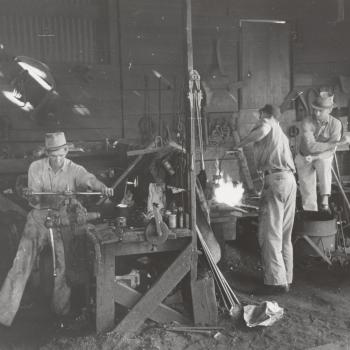Economic indicators ebb and flow, though not with high predictability. In the years after World War II the U.S. economy was growing and its benefits were enjoyed by most middle-class families. Sputtering began in the late-1960s and by the mid-1970s U.S. companies were losing their competitive edge, details Steven Pearlstein in Can American Capitalism Survive? (St. Martin’s Press, 2018). U.S. consumers judged all types of imports to be of better quality and/or of a better price that the U.S.-made counterpart. Several U.S. companies, slow to innovate, were near extinction.
A rescue effort, indeed a transformation, began in the 1980s. President Ronald Reagan (1911-2004) is often associated with this economic comeback, but the factors were many. Re-engineering, mergers, deregulation, sub-contracting, new tech businesses and more all played a part. “The transformation was messy, painful, contentious and often unfair,” writes Pearlstein. However, “it worked.” He outlines the business philosophy that drove the recovery. Briefly: 1.) Government is “significantly responsible for the decline” in U.S. competitiveness; 2.) “The sole purpose of every business is to deliver the highest possible financial return to its investors; 3.) No matter how ruthless, no matter how big the wealth gap, business “must ignore and dismiss moral concerns as naïve and ultimately self-defeating.” Pearlstein nods favorably toward these principles—to a degree. He summarizes them as supply-side economics, maximum attention to shareholders and a self-justifying market.
Pearlstein goes on to argue that the improvements of the 1980s have gone extreme. “What began as a useful corrective” became “morally corrupting and self-defeating economic dogma.” The business philosophy of the moment is driven by supply-side fantasies, anti-regulatory zealots, single-mined management focused on short term stock returns, the “grubby pursuit of self-interest” and a perversion of justice that cheats, manipulates and disrespects loyal workers and ordinary consumers. Today’s business philosophy has “betrayed its ideals and its purpose and forfeited its moral legitimacy,” Pearlstein concludes.
Catholicism agrees that the dominant business attitude has a broken moral compass. But this is not because the economy has taken some otherwise useful principles to an extreme. No, the principles named by Pearlstein are faulty, no matter the degree. Business is a noble vocation, Catholicism repeatedly proclaims. (See Vocation of the Business Leader, NCL, PO Box 291102, Chicago, IL 60629; free.) Further, there can be legitimate differences over how much government regulation is proper; over the relationship between shareholders and stakeholders; over the best way a business can serve the common good. But the prior principle for business is different in Catholicism than in extreme capitalism.
Work and creative genius are needed for any healthy economy, Pope Francis recently told an Italian business publication. A healthy economy “is never disconnected from the meaning of what is produced and economic activity,” he said. The meaning of work, Catholicism insists, is the worker. The first purpose of a business is its workers, which includes executives, janitors, sales force, delivery drivers, part-time consultants, assembly-line people and all others. Start with that principle, says Catholicism, and the chances increase for regular customers, honest suppliers, responsive lenders, successful recruiting and profit over time.
Unfortunately, Francis continued, some people have a business mentality which says money is made by money. But “money, real money, is done with work. It is work that confers dignity on people, not money.” Of course, financial investment is essential. And of course, profit is a good thing as long as “actions and responsibilities, justice and profit, production of wealth and its redistribution, operation and respect for the environment, become elements that over time guarantee the life of the company… From this point of view the meaning of the company widens and makes us understand that the sole pursuit of profit no longer guarantees the life of the company.” When Francis says “This economy kills,” he means extreme capitalism. It kills the very outcome that it pretends to desire.
Presenting Catholic economic principles is a hard sell. Who believes that our company, our firm is here for all the workers? It is a hard sell too because Catholic institutions are hypocritical when, for example, they preach justice but do not pay a family wage. Or hypocrisy is the word when bishops do not deal responsibly with deviant employees.
Yet some companies do operate under the principle that each worker is a subject of work. They do not—and should not—trumpet Catholicism on their marquee. A company does not have to be Catholic in any sense to be excellent. Nor is it is necessary that these good companies are even aware of explicit ethical sources for their operations. Finally, they don’t—and probably cannot—be consistently principled. There are though—partially, imperfectly, inconsistently—companies that are not interested in extreme capitalism.
Can you think of any? Chobani? Southwest Airlines? Starbucks? Procter & Gamble? UPS? Dick’s Sporting Goods? Please react to these suggestions and nominate others.
Businesses, says Pope Francis, “can make a great contribution so that work retains its dignity by recognizing that people are the most important resource of every company, working to build the common good, paying attention to the poor.”
Droel is associated with National Center for the Laity (PO Box 291102, Chicago, IL 60629)










